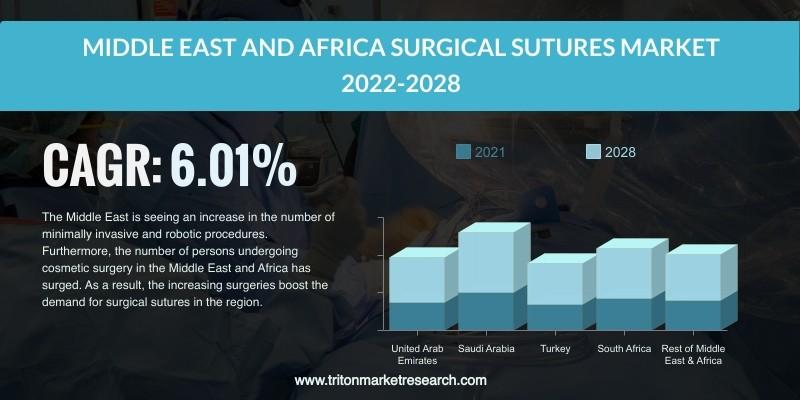Middle East and Africa Surgical Sutures Market Outlook |
Forecast 2022-2028
As per Triton’s analysis, the Middle East and Africa Surgical Sutures Market is experiencing significant growth, with a projected compound annual growth rate (CAGR) of 6.01% in revenue during the forecast period of 2022 to 2028.

Read the Market Summary Here: https://www.tritonmarketresearch.com/reports/middleeast-and-africa-surgical-sutures-market#report-overview
This growth is driven by increasing surgical procedures, advancements in suture technology, and expanding healthcare infrastructure across the region. Key countries contributing to this market include the United Arab Emirates, Turkey, Saudi Arabia, South Africa, and the rest of the Middle East and Africa.
The Middle East and Africa Surgical Sutures Market size is expanding due to the rising prevalence of chronic diseases requiring surgical intervention and the increasing adoption of advanced surgical techniques. Additionally, the market is influenced by trends such as the preference for minimally invasive surgeries and the development of innovative surgical suture types, including absorbable and non-absorbable sutures.
Request a Free Sample of the Middle East and Africa Surgical Sutures Market Report @ https://www.tritonmarketresearch.com/reports/middle-east-and-africa-surgical-suturesmarket#request-free-sample
Major companies operating in the Middle East and Africa Surgical Sutures Market include Teleflex Incorporated, Corza Medical, Medtronic Plc, Stryker Corporation, Ethicon Inc, Demetech Corporation, Zimmer Biomet Holdings Inc, Advanced Medical Solutions Group Plc, and Smith & Nephew. These companies are leading manufacturers and suppliers of surgical sutures, offering a wide range of products such as surgical suture kits, surgical suture scissors, and specialized sutures designed for various medical applications.
The market share of these key players is significant due to their extensive distribution networks and continuous investment in research and development to enhance product efficacy and safety. The market trends indicate a growing demand for antimicrobial-coated sutures and bioabsorbable sutures, which help reduce the risk of surgical site infections and improve patient outcomes.
Purchase this report @ https://www.tritonmarketresearch.com/reports/middle-east-andafrica-surgical-sutures-market#purchase-option
In terms of Middle East and Africa Surgical Sutures Market growth, the increasing number of hospitals and surgical centers, along with rising healthcare expenditure, is expected to drive market expansion. Moreover, the market analysis highlights the importance of regulatory compliance and quality assurance in ensuring the safety and effectiveness of surgical sutures.
Overall, the Middle East and Africa Surgical Sutures Market is poised for robust growth, supported by advancements in medical technology and the increasing need for surgical interventions across the region.
Question & Answer: Middle East and Africa Surgical Sutures Market
Question 1: What factors are driving the growth of the Middle East and Africa Surgical Sutures Market?
Answer: The growth of the Middle East and Africa Surgical Sutures Market is driven by several factors, including the increasing prevalence of chronic diseases requiring surgical interventions, advancements in surgical techniques, rising healthcare expenditure, and the growing number of hospitals and surgical centers. Additionally, the expanding medical tourism sector in the region is contributing to market growth.
Question 2: What are the key trends in the Middle East and Africa Surgical Sutures Market?
Answer: Key trends in the Middle East and Africa Surgical Sutures Market include the increasing adoption of minimally invasive surgical techniques, the development of advanced sutures with better tensile strength and absorption rates, and the growing preference for
synthetic sutures over traditional ones. There is also a trend towards the use of antimicrobialcoated sutures to reduce the risk of surgical site infections.
Question 3: What types of surgical sutures are most commonly used in the Middle East and Africa?
Answer: The most commonly used types of surgical sutures in the Middle East and Africa include absorbable sutures, which dissolve naturally in the body over time, and non-absorbable sutures, which need to be removed after the wound has healed. Specialized sutures, such as barbed and antimicrobial-coated sutures, are also gaining popularity due to their specific benefits in surgical applications.
